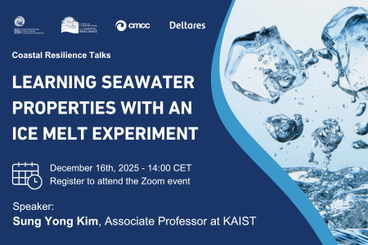Coastal Resilience Talks: Learning Seawater Properties with an Ice-Melt Experiment by Sung Yong Kim
How ice-melt dynamics reveal fundamental ocean density structures — a hands-on exploration with Sung Yong Kim.

-
Date: 16 DECEMBER 2025 from 14:00 to 15:00
-
Event location: Online event
-
Type: Webinars
On 16 December 2025, from 14:00 to 15:00 CET, the Coastal Resilience Talks will feature Professor Sung Yong Kim, Associate Professor in the Mechanical Engineering Department at KAIST (Korea Advanced Institute of Science and Technology), in a webinar organised by the DCC for Coastal Resilience in collaboration with the Partners Alliance Network (PAN).
This session introduces a hands-on and interactive experiment designed to explore fundamental physical properties of seawater. Using a simple yet revealing ice-melt demonstration, participants will uncover how temperature, salinity, and density shape ocean structure — an approach that offers an accessible and engaging way to communicate key ocean concepts to learners of all ages.
Abstract
In this talk, participants will explore the fundamental physical properties of seawater and the resulting density structure in the ocean through a simple yet powerful ice-melt experiment. By placing ice cubes in freshwater and seawater containers, the experiment reveals why ice melts differently in the two environments. The session will use temperature-salinity diagrams and a real-dye demonstration to visualize and explain the underlying oceanographic processes.
About the Speaker
Sung Yong Kim is an Associate Professor in the Mechanical Engineering Department at KAIST (Daejeon, Republic of Korea). He earned a B.S. in Naval Architecture and Ocean Engineering from Seoul National University (1999), and a Ph.D. in Oceanography from the Scripps Institution of Oceanography, University of California San Diego (2009). His research focuses on coastal circulation, sub-mesoscale processes, statistical and dynamical data analysis, environmental parameterizations, and operational coastal ocean observing systems.